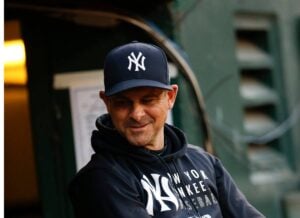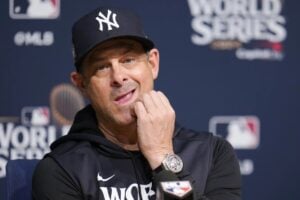Deion Sanders in pinstripes: A look back through Yankee eyes
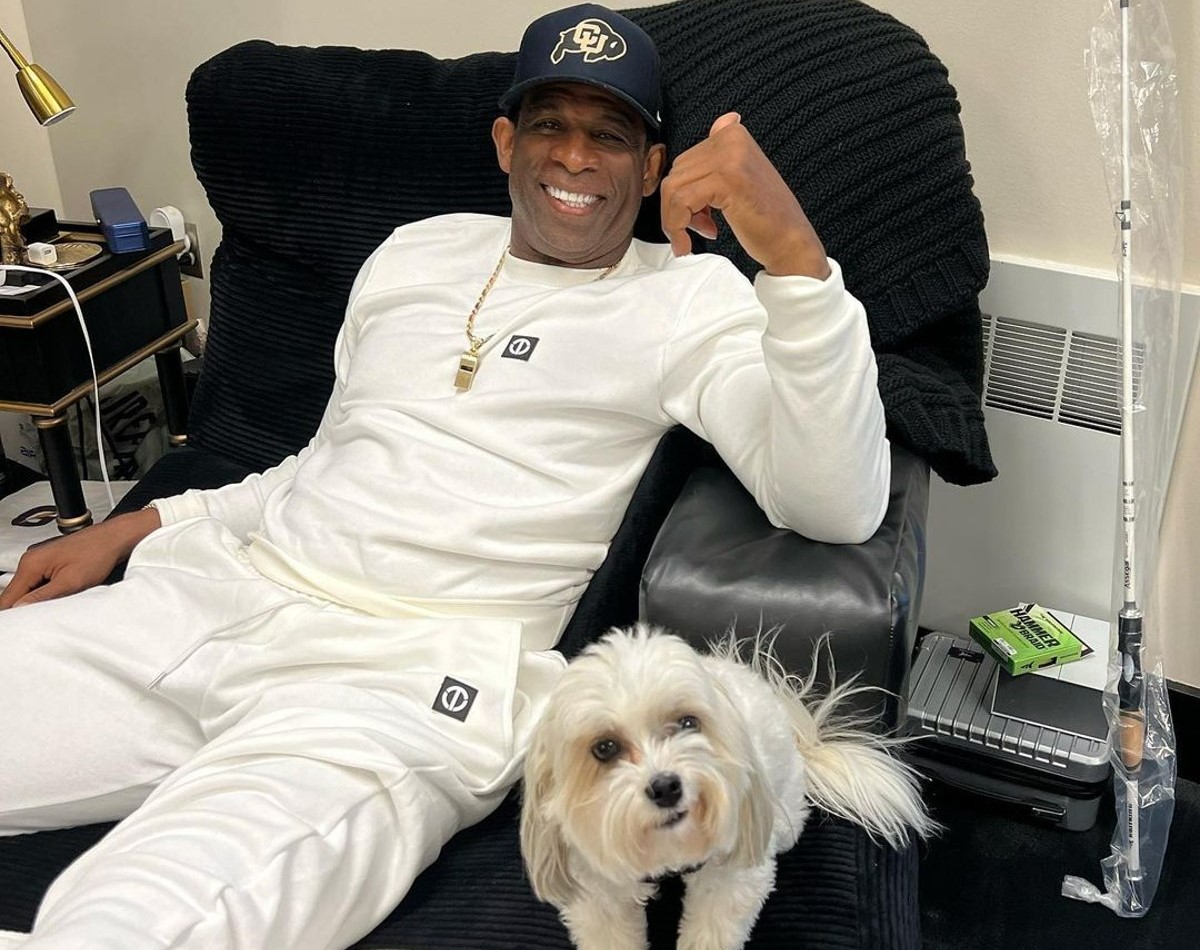
John Allen
More Stories By John Allen
- Mother’s Day: How Anthony Volpe’s mom molded him into a Yankee phenom
- Aaron Judge on verge of joining elite Yankees club, finds inspiration in Winfield, Jeter, CC
- Steinbrenner ‘got ears’ to hear Yankees’ challenges, yet no gurantee of change
- Michael Kay’s show heading to December ending amid uncertainty over ESPN deal
- Yankees’ Gleyber Torres projected to sign with NL West contender
Table of Contents
Yankees pitching legend Ron Guidry continues to consider NFL great Deion Sanders as among the most outstanding talent on the baseball field even more than two decades after he left baseball. The former Yankees ace still recalls the player as potentially one of the fastest individuals he had ever witnessed in a baseball uniform.
Without a doubt, Deion Sanders possessed remarkable speed, a quality that paved his way as a dual-sport athlete in both Major League Baseball and the NFL. His ultimate triumphs, however, unfolded on the football field, where he solidified his legacy as an enduring cornerback, donning the jerseys of the Falcons, 49ers, Cowboys, Washington, and Ravens from 1989 to 2005. In more recent times, “Prime Time” has transitioned into “Coach Prime,” leading collegiate football programs at Jackson State and Colorado.
In Deion Sanders’ inaugural year as the head coach, the Colorado Buffaloes have seen a resurgence, with the 56-year-old effortlessly maintaining his grip on the spotlight. However, well before this Florida State alum achieved Hall of Fame status in football, his magnetic personality embarked on his professional athletic journey by seeking to showcase his baseball skills with the New York Yankees.
Guidry and other Yankees talked to the Daily News about the dual sports phenom recalling his years in pinstripes.
Deion Sanders’ time in the Bronx
In an era when the late George Steinbrenner displayed a penchant for drafting athletes of Deion Sanders’ ilk, the speedster joined the Yankees as a 30th-round selection in 1988. According to longtime Yankees pitcher Dave Righetti, George made a concerted effort to select players like Deion Sanders, Bo Jackson, and John Elway. He also mentioned the presence of a quarterback named Billy Cannon Jr. Righetti characterized it as a focus on “star power.”
However, Deion Sanders failed to shine as a standout player during his tenure with the Yankees. Guidry believes he didn’t do his best then.
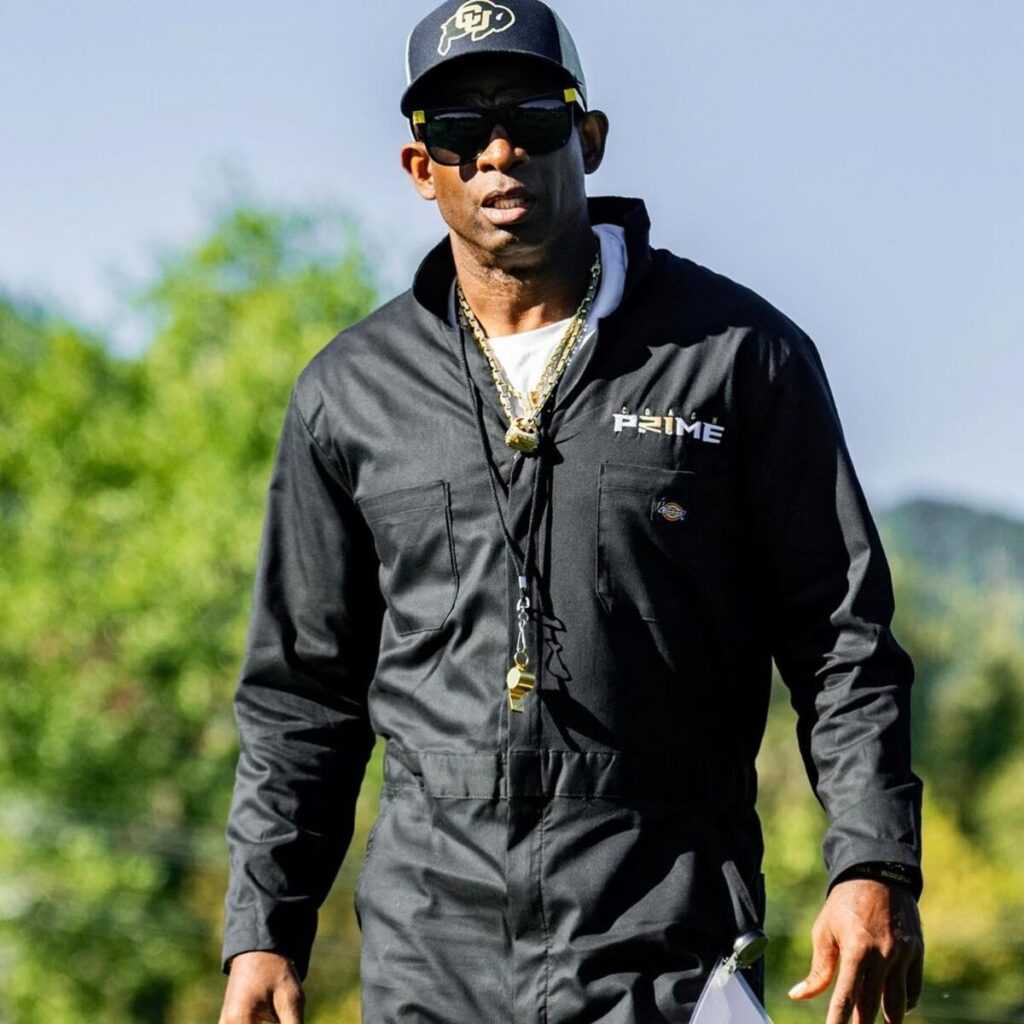
After spending portions of two seasons in the minor leagues, Deion Sanders managed to participate in 71 games for the Yankees from 1989 to 1990, all while embarking on his NFL journey. In his role as center fielder, his batting line stood at a modest .178/.248/.306, accompanied by five home runs, 16 RBI, and nine stolen bases for the Yankees.
Guidry remarked that Deion Sanders had the potential to emulate the likes of Rickey Henderson, the legendary base-stealer and leadoff hitter, for the Yankees if he had honed his ability to handle breaking balls and wholeheartedly dedicated himself to baseball from the outset. Yet, Deion Sanders harbored dual passions, and according to Guidry, his intuitive sense for situational baseball lagged behind his football acumen during the early stages of his career.
Guidry expressed his belief that, on a deeper level, the individual knew that football was his true calling. He added that he wasn’t sure if the person had given his full effort to excel in baseball. He acknowledged that it might sound harsh to phrase it that way, but he felt that Deion Sanders’ primary focus was on football, and baseball was more of an attempt.
Toward the conclusion of the 1990 season, the Yankees bid adieu to Deion Sanders. While his stay in the Bronx was brief, he departed, leaving behind a vivid tapestry of memories amongst his teammates before flourishing in both the realms of sports.
Deion Sanders’ number game pitted veterans against him
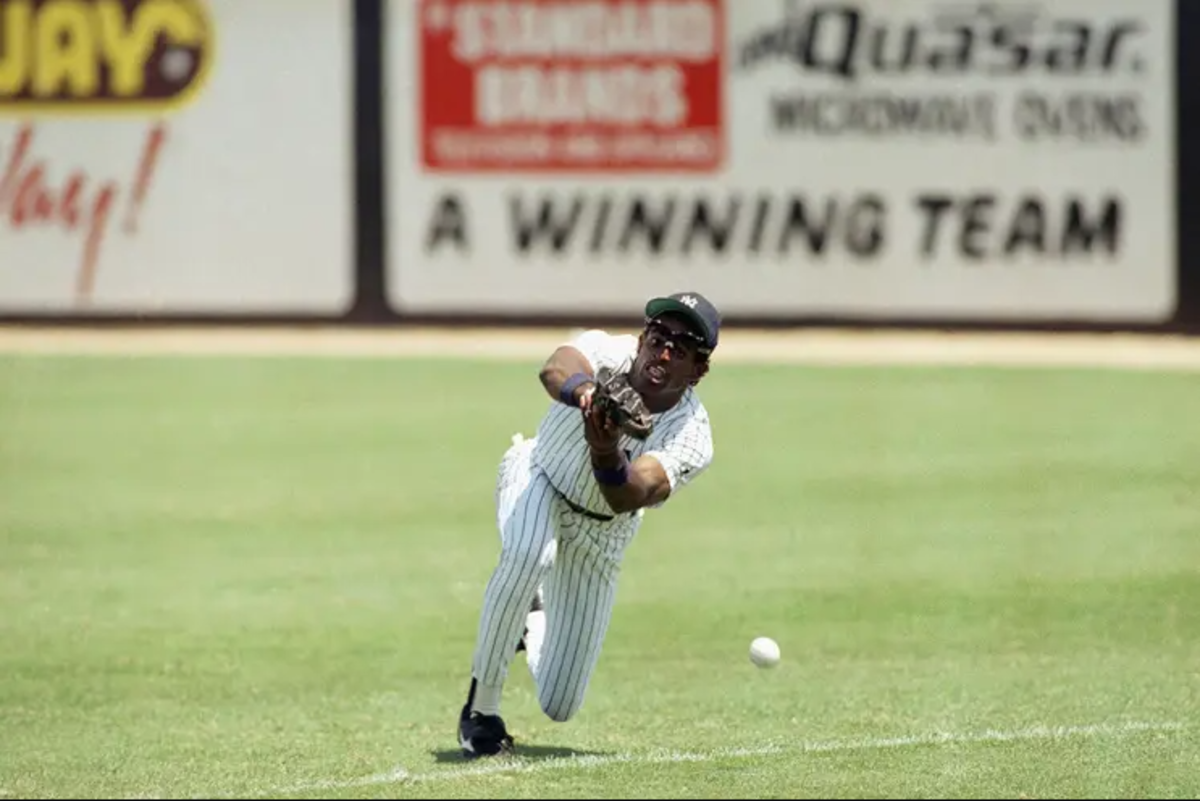
Having previously worn the number 2 during his time at Florida State and in the minor leagues, Deion Sanders found himself sporting the rather unconventional number 71 during spring training in 1989. As reported by the Sun-Sentinel at the time, he was not particularly fond of this numerical assignment and sought a single-digit alternative.
However, the lowest available number was 30, a digit that had been prominently donned by Willie Randolph for a remarkable 13-year stretch. Randolph, who also held the role of co-captain alongside Guidry, had recently departed to join the Dodgers during the prior offseason. Despite the circumstances, Deion Sanders was assigned the number 30. This decision did not sit well with some seasoned veterans, prompting Guidry to swiftly instruct the equipment manager, Nick Priore, to procure a new uniform for the rookie.
Guidry clarified that there were no hard feelings toward Deion Sanders. He personally wasn’t upset with him. However, he held the belief that the number should have been retired for a while because of what Willie had achieved while wearing it. He noted that, although Deion Sanders was undoubtedly a great player and went on to have a remarkable football career, he hadn’t earned the right to wear that number in the context of baseball.
At that time, Deion Sanders acknowledged that he understood when they informed him that they were considering retiring it, but he mentioned that he hadn’t really contemplated it otherwise. While the Yankees refrained from retiring No. 30 in honor of Randolph, his contributions were acknowledged with a plaque in Monument Park. On the other hand, Deion Sanders’ tenure with the number was decidedly brief.
Righetti mentioned, “I think it lasted a day.” However, according to The Sentinel, it was reported that Sanders had switched to No. 44, which was Reggie Jackson‘s old number, during his first workout, even though he had initially worn a No. 30 uniform.
The clash with Carlton Fisk
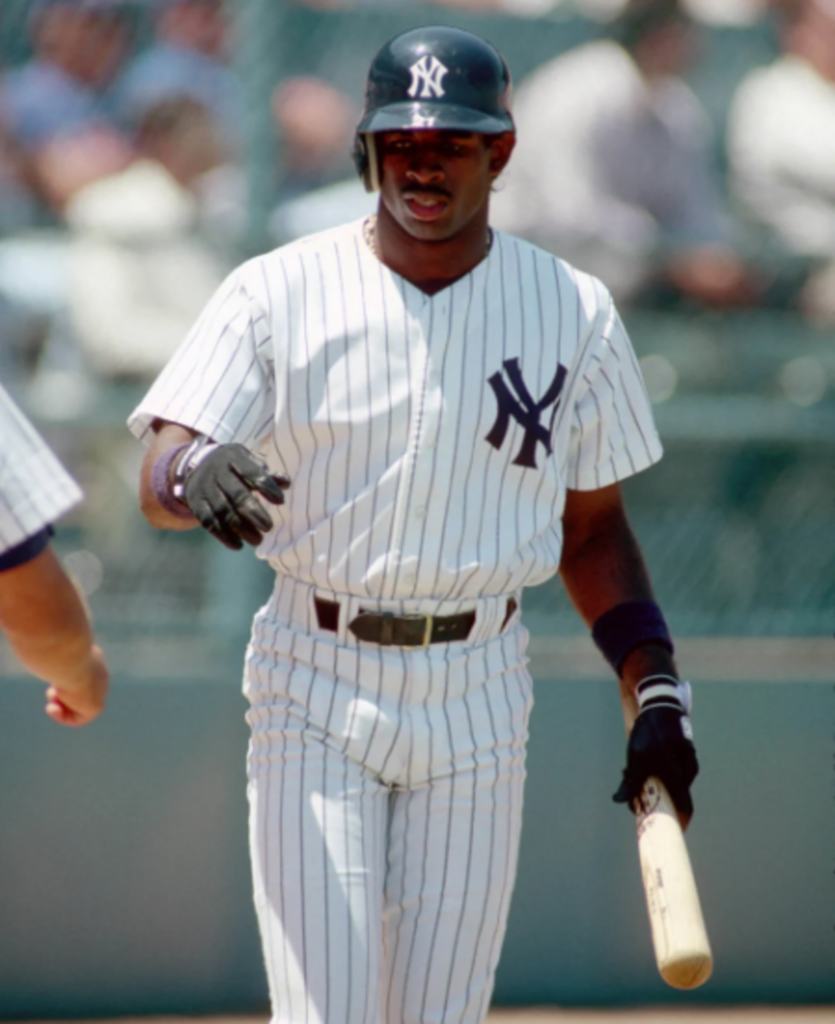
May 22, 1990, saw a memorable clash between Deion Sanders and the White Sox’s illustrious catcher, Carlton Fisk, who would eventually earn a place in the Hall of Fame. The incident unfolded when Sanders failed to sprint to first base after hitting an infield pop-up during the third inning. Fisk, who was already irritated, as he believed Sanders had etched a dollar sign in the batter’s box dirt earlier in the game, erupted in a fit of frustration.
“Run the f–king ball out, you piece of s–t,” Fisk barked, per multiple accounts.
Righetti remembered acknowledged that Fisk had likely told Deion Sanders that he needed to run in the league. Righetti’s main regret was that they weren’t the ones to address the issue by telling the player that he had to run.
In contemporary times, Deion Sanders’ actions might not raise eyebrows, as it has become commonplace for players to forgo full sprints on routine balls. However, it’s important to note that during that era, the expectations and norms surrounding such behavior were distinctly dissimilar.
According to Yankees great Don Mattingly, nowadays, it’s common for players to engage in such actions. He noted that back then, it was a different era, and Deion Sanders’ behavior was considered ahead of its time on the field.
The tension between Deion Sanders and Fisk reached its apex during Sanders’ subsequent at-bat. It was during this moment that, as reported by Newsday, he allegedly remarked to Fisk, “The days of slavery are over.” This provocative statement triggered a bench-clearing altercation. Don Mattingly, unwavering in his support for Deion Sanders, stood alongside the outfielder as he pointed his bat menacingly at Fisk.
Righetti recounted that during Deion Sanders’ next at-bat, he extended his hand to shake hands with Fisk as a way to acknowledge his mistake. Fisk simply looked at him, and in response, he turned around and extended his hand to convey that he had made an error.
Deion Sanders had developed a reputation for his habit of sketching dollar signs in the dirt, but during an interview with “The Rich Eisen Show” last year, he vehemently denied Fisk’s allegations of such behavior, implying that the Boston great had fabricated the claim.
Deion Sanders clarified that his practice was to draw half a circle, resembling a “B” in the middle, extending up to his stride point. He explained that this was what he consistently drew in the batter’s box throughout his entire career.
Life after hanging pinstripes
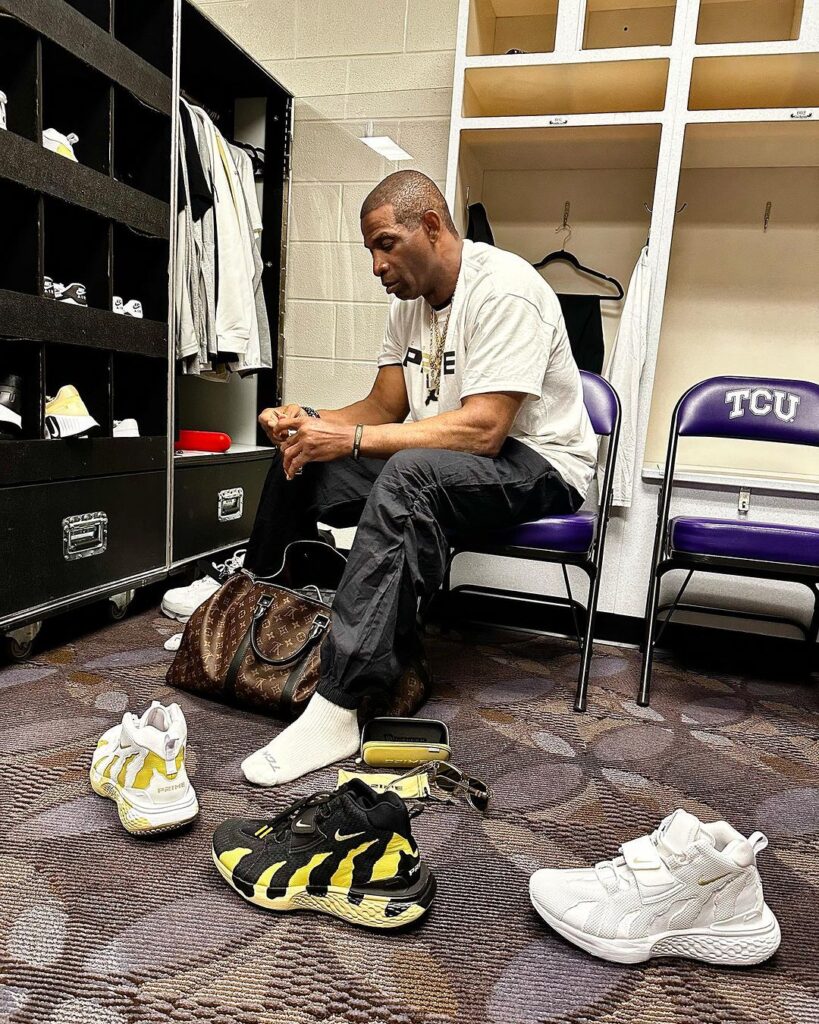
Deion Sanders wasn’t the sole athlete juggling commitments between baseball and football in 1990. Bo Jackson had already made a name for himself by excelling with the Royals and Raiders for several years by then. This set the stage for a captivating spectacle when Kansas City paid a visit to Yankee Stadium on July 17.
He left the Bronx for Atlanta in 1994. Deion Sanders played for the Giants and the Reds until 2001. Following continued pressure to choose either MLB or NFL, he famously quoted:
“Football is my wife and baseball is my mistress.”
Deion Sanders said goodbye to baseball in 2001 while on a minor league contract with the Blue Jays.
According to Mattingly, he was quite different from the perception of him by the general public. He noted that Deion Sanders was always present in the locker room and blended in like one of the guys. Righetti mentioned that he had a great deal of admiration for Deion Sanders, describing him as a good kid. He noted that the player was from the South and had a down-to-earth personality. Righetti never felt that he was attempting to be dominant or take control of situations.
Deion Sanders’ baseball career saw significant improvement as he donned the uniforms of the Braves, Reds, and Giants between 1991 and 2001, although he did take intermittent breaks from the sport during the latter part of his MLB journey. Notably, Deion Sanders enjoyed a standout season in 1992, boasting a .304 batting average before further dazzling with a remarkable .533 average in the World Series, despite Atlanta ultimately falling short.
As a two-time Super Bowl champion, Deion Sanders achieved the unique distinction of participating in both the Big Game and the Fall Classic. During his final MLB season in Cincinnati, Sanders found himself sharing a locker room with the current Yankees manager, Aaron Boone, and the hitting coach, Sean Casey.
Boone fondly recalled their first game of the 2001 season as his favorite memory. Fresh off a two-year hiatus from the majors, Deion Sanders made a spectacular return, belting a three-run homer and amassing three hits in that memorable game.
Boone commented that Deion Sanders took control of the game despite having been out of Major League Baseball for some time. The Yankees manager also himself hit a home run during the game.
Boone lauded Sanders as a “great” teammate, noting that he was effortlessly easygoing to be around. However, Casey took his admiration a step further, telling that “Prime was one of my all-time favorite teammates, without a doubt.”
Casey stated that Deion Sanders served as a motivator. He noted that being around him was a guarantee that you would improve, both as an athlete and as a person.
Boone believed that it was challenging to dispute the massive impact and excellent job Deion Sanders has done with Colorado Buffaloes. He considered it one of the most significant stories in the sports world at the moment and found it truly remarkable.
What do you think? Leave your comment below.
- Categories: aaron boone, dave righetti, Deion Sanders, don mattingly, ron guidry, sean casey
- Tags: aaron boone, dave righetti, Deion Sanders, don mattingly, ron guidry, sean casey

 Follow Us
Follow Us